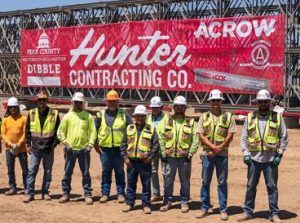As Arizona’s construction season hits its stride, Hunter Contracting Co. is marking its 65th anniversary with a slate of high-impact projects that highlight its enduring role in shaping the state’s growth. The Gilbert-based contractor continues to expand its presence across Arizona, combining innovation, sustainability, and community partnership in every project it delivers. What began in 1961 as a small family-run ditch-lining business has evolved into one of Arizona’s most respected heavy civil contractors. With more than 500 employees, offices in Gilbert and Tucson, and five straight years of double-digit revenue growth, Hunter is demonstrating how a legacy firm can scale without losing its community-driven ethos or its appetite for innovation.
“Our success comes from the talented employees of Hunter who build great relationships and great projects,” said Chuck English, president of Hunter Contracting Co., who recently celebrated 40 years with the firm. “We build infrastructure that communities rely on every day. Whether it’s water treatment, roads and bridges or parks, our goal is to create lasting value for Arizona residents.”
That value shows up across Hunter’s 2025 portfolio, a lineup of projects that spans wildfire recovery in the north, transportation expansion in the south and water infrastructure in some of Arizona’s fastest-growing municipalities. It is work that demands technical agility—from drone-enabled inspections to trenchless rehabilitation—and positions the company as a problem-solver for issues tied to climate resilience, rapid growth and long-term resource management.
Hunter’s 2025 project lineup underscores its role in delivering infrastructure that supports growth across Arizona. In Marana, crews are widening 1.85 miles of Twin Peaks–Rattlesnake Pass Road with significant excavation, new storm-drain systems, retaining walls, and two signalized intersections to improve mobility, safety, and flood control in a rapidly expanding region. In Chandler, the company is constructing a half-MGD membrane wastewater lift station for the new Santan Mountain Casino, incorporating smart water-monitoring technology that conserves thousands of gallons throughout installation and operation.
In northern Arizona, Hunter completed an award-winning rehabilitation of the Inner Basin Waterline in Flagstaff, restoring potable water service after wildfire damage. The project repaired 46 sites across 13 miles of steep mountain terrain, using trenchless techniques, slope stabilization, and drone-based inspections to safeguard a critical piece of utility infrastructure.
In addition, preconstruction is underway on Desert Sky Park Phase 2 in Gilbert and Mesquite Groves Park in Chandler, both designed to expand community recreation amenities while integrating reclaimed water systems for long-term sustainability.
Building on Innovation to Meet Arizona’s Next Chapter
Hunter’s growth is propelled by a culture that treats adaptability as an operational advantage.
“Every generation at Hunter has pushed the company into new territory — from expanding across the state to embracing new construction technology,” said Senior Vice President Bob Carlson, who recently marked 30 years with the firm. “That willingness to evolve is why we continue to grow.”
The company’s digital transformation is reshaping how infrastructure gets built in Arizona. Cloud-based scheduling, real-time safety tracking and integrated project controls have become standard across Hunter job sites, driving efficiency and improving coordination with cities, tribal communities and private development partners. As demand for infrastructure surges, Hunter is also investing in apprenticeships, trade training and long-term career pathways that help retain talent and build a workforce prepared for the next 65 years.
“Every project we deliver is built on trust. Trust from our cities, our partners and our people,” English said. “That foundation has guided us for more than six decades, and it will carry us forward into the future.”
Hunter Contracting Co. will commemorate its 65th anniversary in February 2026, recognizing a legacy rooted in innovation, community investment and infrastructure that keeps Arizona’s economy moving.
















